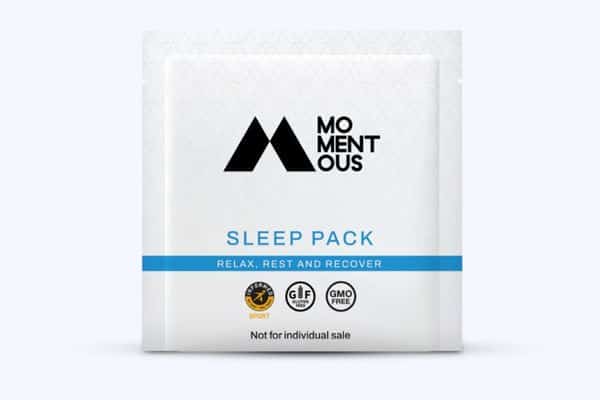Just started on stimulants for ADHD and find they are making you sleepy? You are not alone! Good news, this might be the start of you finally getting the sleep you need!
Adderall Makes Me Tired!
Believe it or not, many people find when they first take stimulants for their ADHD actually find they get sleepy!
This is confusing when you were warned ‘Don’t take them too late or you won’t be able to sleep’ by the prescribing doctor.
So how can this be? Well it turns out that every sleep disorder is more common in ADHD than the non ADHD population. Both falling asleep and staying asleep is a bigger problem for people with ADHD.
And it turns out that for some people, when you treat ADHD, you are finally treating the cause of their insomnia!
So it may be a good sign that you become sleepy when taking this new medication that you were warned ‘might keep you up at night’. Your life might be about to get a lot better.
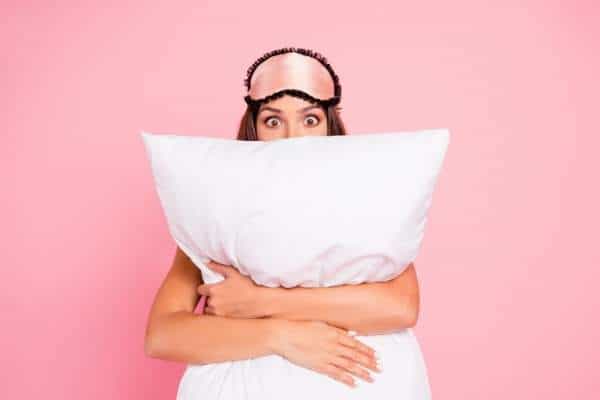
Adderall and Sleepiness
A lot of ADHDers describe themselves as ‘Night Owls’. This means we feel most productive in the evening and we go to bed late.
This ‘Night Owl’ tendency is actually due to the difference in the ADHD brain, that delays our circadian rhythm.
Being a Night Owl may be great if this fits your lifestyle. Not so great when you need to fit into a 9 to 5 schedule, then you end up being sleep deprived.
I’ve always been a Night Owl personality, so it was pretty weird when I first started taking stimulants after being diagnosed with ADHD as an adult.
I suddenly wanted to go to sleep at 9pm rather than my usual 12:30. I was overcome with exhaustion early in the evening when first taking stimulants, and I slept a ton.
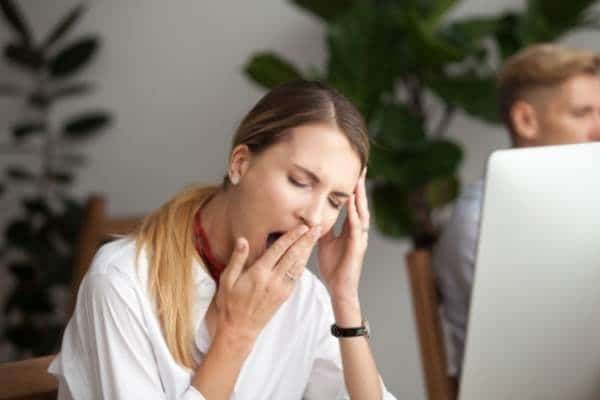
It didn’t last forever, but it was pretty odd. Now I go to bed around 11pm and my sleep is so much better. And I’ve got the data to prove it with my Oura ring!
So if you are in a similar situation, I’d suggest you give yourself a couple of weeks to get adjusted. You might be finally be catching up on some long term sleep deprivation, and your sleep patterns might be sorting themselves out.
Some ADHDers actually take a dose of stimulants right before bed because it helps them sleep!
Why Do Stimulants Make Me Sleepy?
So what’s the deal – why does this happen when it is the opposite of what you would expect? Shouldn’t stimulant medications keep you up at night?
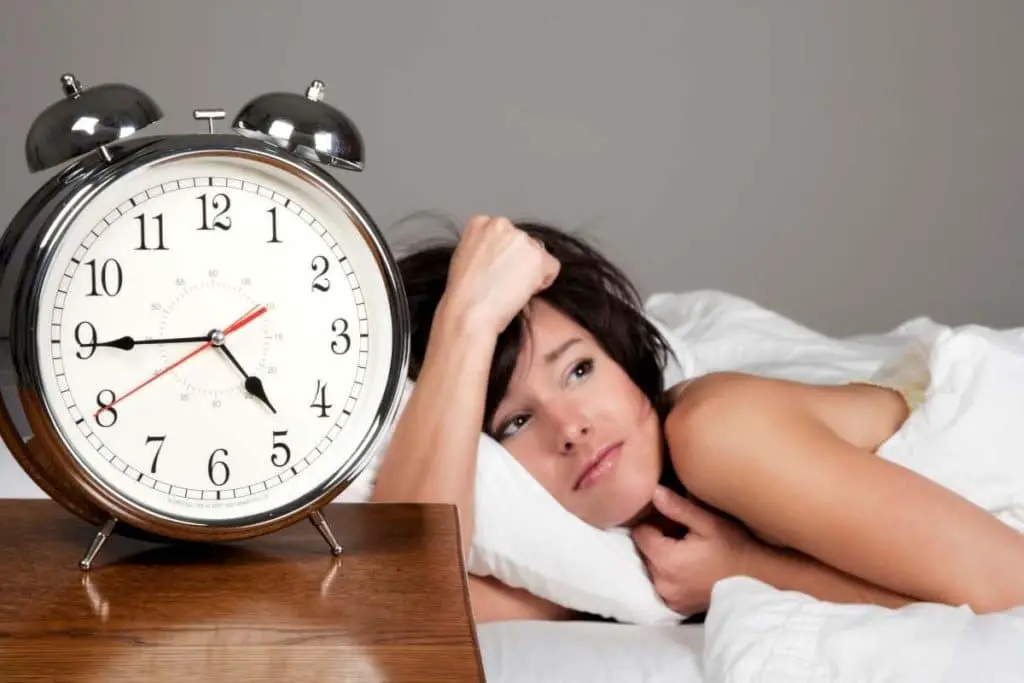
For years stimulants were thought to cause insomnia.
Actually, a larger number of adults with ADHD find their sleep improved when taking stimulants. Just a fraction (estimated at 10-20%) have their sleep worsened after more than the initial few days of starting stimulant medication.
Dr. Dodson, a well respected adult ADHD expert, asks his patients to take a nap shortly after taking their stimulants for the first time.
What? Take a nap! After you take your adderall!
This is to prove that you can sleep with the medication in their system. Simple and effective.
For years, many of his ADHD patients have found they actually sleep better while taking stimulants.
Sleep on Adderall
But lots of people do have trouble sleeping when they first take stimulants.
For some people on stimulant medications for ADHD, it may be the wearing off of the stimulants that causes difficulty with sleep. The mind was more focused all day, and now it is free to roam.
I found this happened to me in my first couple of months on stimulants, after those first few days of exhaustion.
Now I was diagnosed with ADHD while I had burnout from work, not because someone else in my family got diagnosed and I realized ‘Oh, that’s me too!’.
My mind was absolutely racing (hyperactive) at the time, and not in a good way. So my experience was unique to that situation.
It really was like the my mind was a race horse. The stimulants reined it in during it in during the day. But then when they wore off, my mind was off to the races, with multiple thoughts again.

It was almost like it was making up for being constrained all day. And this was just when I wanted to go to sleep.
It was really annoying but I could see what a difference the stimulants made during the day on my racing mind and my emotional state. I was not going to stop taking them.
I actually had to take a prescription sleep aid for a bit. Eventually it all evened out, and my sleep is really pretty great now, but it was a bumpy ride.
Sleeping on Adderall
My experience matched what Dr. Dodson has been saying for years. Don’t rush to blame the stimulants just because a newly diagnosed and treated ADHDer has insomnia.
When stimulants are started for ADHD taking time to explore sleep issues is important. stimulants.
Dr. Dodson’s nap test may give useful information. If you can take a nap after you take your stimulants, then that is not what is keeping you up at night.
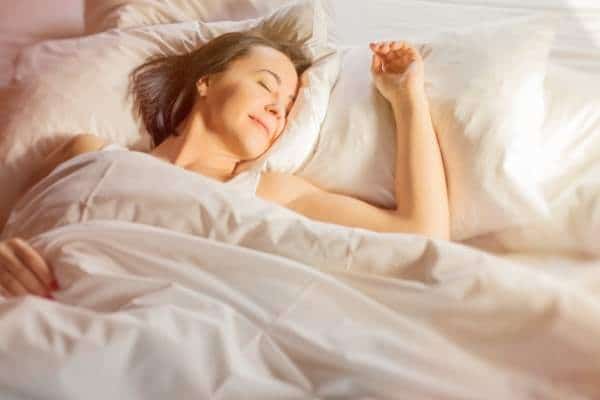
And guess what? New research back this up!
Adderall and Sleep
We should actually consider sleep disturbance itself as a main symptom of ADHD, according to this study in 2020.
They showed that specific anatomical differences in the ADHD brain lead to both ADHD symptoms and sleep disturbances.
Anatomical!!! Like I literally have a difference in my brain that has been causing sleep problems! My whole life!!
WTF!

These anatomical areas have key roles in both dopamine signalling and the circadian rhythm.
So for an ADHDer taking a stimulant like Adderall could also help normalize our circadian rhythm (being a Night Owl)!!!
This is exactly what has happened for me!! Although it took some time, a few months actually.
Which is weird right? Because we are all told that stimulants only work while they are in your system.
Nope. Research has also shown that taking ADHD medications regularly could lead to better sleep over a longer period of time.
So putting an effort in optimizing medication for ADHD and insomnia could have long term benefits, beyond the immediate effect on sleep for one night.
Yep. Much better sleep happening over here.
Sleep Deprivation and ADHD
And figuring this out is really important, because ADHD are generally sleep deprived.
This really holds us back, because sleep is incredibly important. We need sleep to have a good quality of life.
Sleep is necessary for information processing, memory consolidation, executive functioning, and social functioning. This is really important stuff.
The prefrontal cortex is particularly susceptible to the effects of sleep loss, which is precisely the area of the brain that is most affected by ADHD. So people with ADHD are very sensitive to the effects of sleep deprivation.
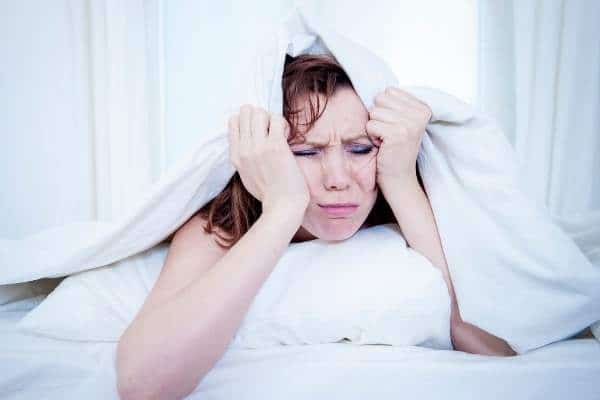
Adderall Alternative: Clonidine for Sleep in ADHD
Ok, but what about those people who will have insomnia with stimulant medications (10-20% estimated, remember).
If after a decent effort you start to realize that you fall into that group, there are other options.
There are non stimulant medications for ADHD including the alpha-agonists clonidine and guanfacine. They can be taken in addition to stimulants, or without stimulants.
It seems that clonidine is more helpful for insomnia than guanfacine. (Although both clonidine and guanfacine can be very helpful for emotional regulation.)
Clonidine has been used to treat insomnia with ADHD. In one study of children with ADHD taking clonidine (doses ranging from 50-300mg), 85% had improvement of their insomnia.
Clonidine starts to have an effect on sleep within 30 minutes. Clonidine helps with falling asleep (sleep-onset latency), quality of sleep, length of sleep, and even improved morning awakening.
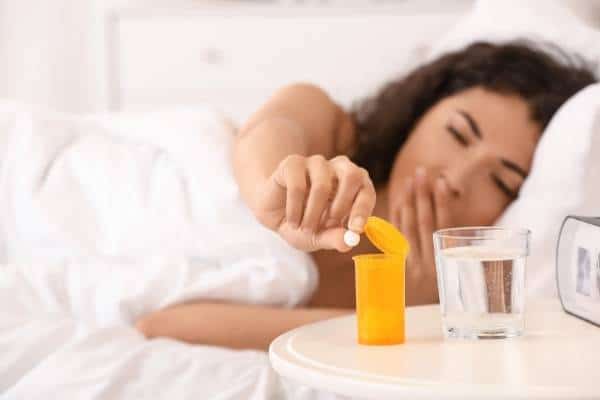
Adderall and Insomnia
So, the way we have been thinking about stimulant medications and insomnia with ADHD may have been totally wrong.
Rather than causing insomnia, more often stimulants will help insomnia in ADHD. But you might need to get through an adjustment period.
Understanding this could make a huge difference in lives, because ADHDers are generally chronically sleep deprived.
Just realizing you have ADHD can make a huge difference, Dr. Dodson uses 3 questions to diagnose ADHD. ADHD is neurobiological which means you’ve had ADHD your whole life, so sleep has probably been an issue your whole life. Whether you realized it or not.
I never thought the fact that it took me 30-60 min to fall asleep was unusual. I joked that my husband had a ‘superpower’ of falling asleep in 10 minutes or so. It turns out that isn’t actually a superpower, lots of people can do that.
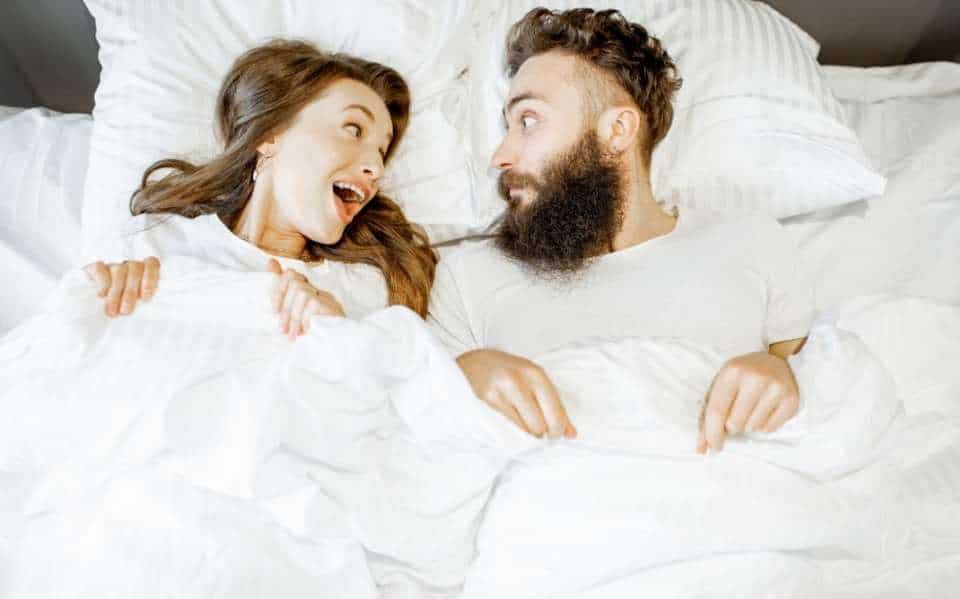
Getting a good night’s sleep can take a lot of effort. Medications for your ADHD can be one tool to help.
Best Sleeping Medication For Adderall?
If insomnia on adderall is a real problem for you, you can speak to your doctor about a sleep aid.
I’ve used Dr. Huberman’s famous ‘Sleep Cocktail’ (in depth post here). Dr. Huberman, of The Huberman Lab Podcast, is a neurobiologist and professor at Stanford.
He is not a fan of melatonin and recommends instead a 3 ingredient ‘Sleep Cocktail’ for sleep.
The 3 ingredients are Magnesium Threonate (a special magnesium easily absorbed into the brain), Apigenin and L-Theanine.
I’ve used this ‘Sleep Cocktail’ many times and found it worked very well. The great thing about it is that both Magnesium Threonate and L-Theanine are really helpful for ADHD on their own.
Interested in buying the ‘Sleep Cocktail’ ingredients?
Consult your Physician or Registered Dietitian before starting nutrition supplements.
Dr. Huberman has partnered with Momentous to provide high quality supplements that you can trust. They offer the sleep cocktail in convenient packs, as well as Huberman Lab designed supplement bundles.
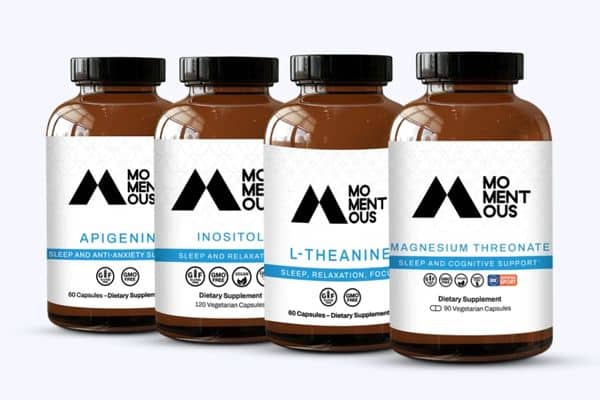
Also: You can get 15% off your Momentous order with the code VASTMIND
Rather buy the ingredients on Amazon? Here are some links for that:
Ways to Deal With Adderall Keeping You Up At Night
Here are some other options to you get to sleep. If you just started your medication and have insomnia, remember that it will likely settle down in a couple of days.
Practicing Non Sleep Deep Rest protocols during the day can help us learn to make transition from alertness to sleep, by un-focusing our mind and thoughts. Yoga Nidra and self hypnosis are two great Non-Sleep Deep Rest options.
Meditating while lying down in bed or doing a NSDR protocol at bedtime can help you fall asleep as well.
Another technique particularly useful for the ADHD brain is to take time to journal. Write down a list of thoughts, ideas and plans, to get the ideas out of your brain before you go to bed.
And don’t forget all the boring ‘sleep hygeine’ stuff that is actually super important.
You probably know about these: get some exercise during the day, avoid alcohol, reduce caffeine, avoid the blue light of screens before bed, wake up at the same time each day, etc.
Yes it sounds boring, but is actually effective, reducing the time to fall asleep by up to 60 minutes in some studies. Especially waking up at the same time, and getting exposure to sunlight right after waking up is super important.
Have a good sleep.
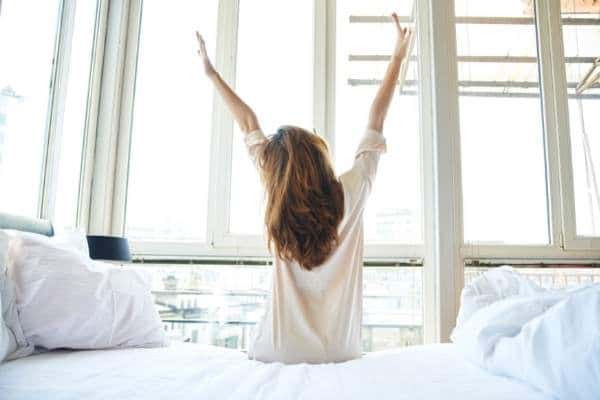
References
- Association between sleep duration and attention-deficit hyperactivity disorder: A systematic review and meta-analysis of observational studies
- A systematic review of circadian function, chronotype and chronotherapy in attention deficit hyperactivity disorder
- Impact of adult attention deficit hyperactivity disorder and medication status on sleep/wake behavior and molecular circadian rhythms
- ADHD treatments, sleep, and sleep problems: complex associations
- Sleep in Adults with Attention Deficit Hyperactivity Disorder (ADHD) Before and During Treatment with Methylphenidate: A Controlled Polysomnographic Study
- Impact of sleep restriction on affective functioning in adolescents with attention‐deficit/hyperactivity disorder
- Safety, Tolerability and Efficacy of Drugs for Treating Behavioural Insomnia in Children with Attention-Deficit/Hyperactivity Disorder: A Systematic Review with Methodological Quality Assessment
- Shortened Sleep Duration Causes Sleepiness, Inattention, and Oppositionality in Adolescents with ADHD: Findings from a Crossover Sleep Restriction/Extension Study
